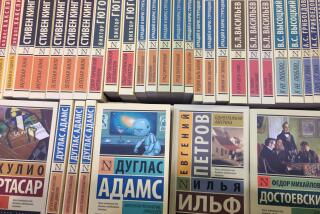THE OPENING QUESTION : PIZZA IN PUSHKIN SQUARE: What Russians Think About Americans and the American Way of Life <i> By Victor Ripp (Simon & Schuster: $18.95; 224 pp.)</i>
- Share via
What Russians think--generally that we are energetic, ignorant and egocentric--may not penetrate our character very deeply, for it is understandably based on the skimpiest of evidence. But their opinions are fascinating nevertheless, for as Victor Ripp puts it, “Russia’s image of America includes Russia’s image of itself.”
America has been Russia’s familiar Other, “the antagonistic friend, the model to be copied but also transcended,” since the 19th Century, Ripp writes, when both countries faced the colossal task of settling their vast frontiers to the Pacific, “the Mediterranean of the future.” Our greater success at the task has left Russians fascinated by 19th-Century American novelists, perhaps in search of the era’s secret idealism and vitality, which they no doubt could use today.
In their fascination, however, they often forget that the America they desire is different from the one we now inhabit. Ripp recalls the Pravda correspondent who recently traveled across America to join the crowds paying homage at the grave of James Fenimore Cooper. The correspondent found plenty of crowds all right, but they were streaming toward the Baseball Hall of Fame, a building that “was like a temple, with marble columns, and with gold and silver everywhere.” Nearby, Cooper’s grave was modest, bleak and unvisited.
The Russians’ disappointment with contemporary Americans follows Ripp everywhere, and while he usually deflects it with good- humored satire of his own (“Moscow stores and restaurants and all the various bureaus pride themselves on the number of ways they can say ‘closed’--closed for inventory, closed for renovation, service for special groups only, sanitation day”), it begins to grate on him by book’s end. He bristles, for example, at the subtle condescension in a newspaper article observing that “Americans like to be smiled at.”
Ripp’s humor might have been restored, however, had he seen the inevitability of mutual condescension when a culture based on the group meets one centered around the individual. The differences are especially apparent in a basketball game, where Ripp notices “an absence of exultation. There was no crowning in triumph, no boisterous shouting. Everyone played earnestly.” Seeing the author, however, one of the players executes a neat reverse lay-up, punching the air in the American gesture of self-congratulation. Ripp regards the gesture as a “homage of imitation,” but he misses its mischief, its jab at the American need to grandstand.
More to Read
Sign up for our Book Club newsletter
Get the latest news, events and more from the Los Angeles Times Book Club, and help us get L.A. reading and talking.
You may occasionally receive promotional content from the Los Angeles Times.










